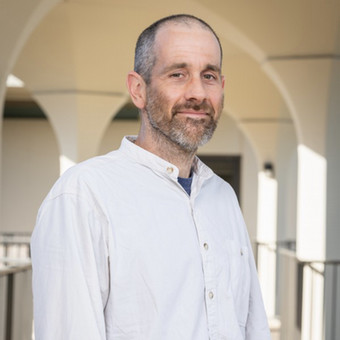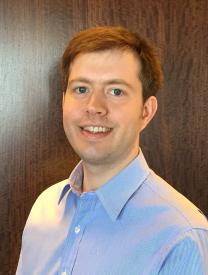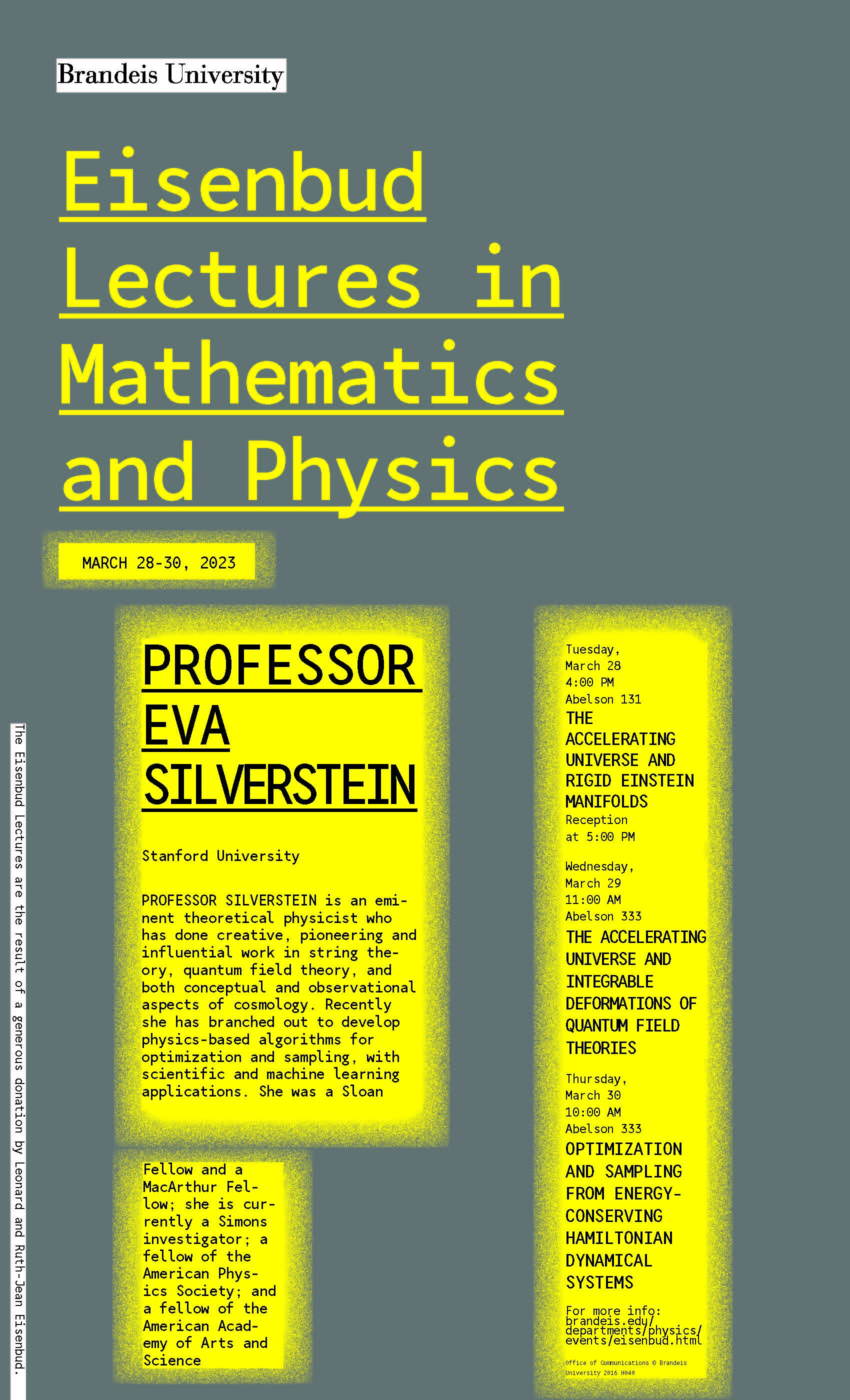Eisenbud Lectures in Mathematics and Physics
2025-2026

John McGreevy is Professor of Physics at the University of California, San Diego. He is a theoretical physicist with interests in quantum matter, string theory, and quantum field theory. More information can be found here: http://physics.ucsd.edu/~mcgreevy/.
Titles:
- Lecture 1: Entanglement Bootstrap, a perspective on quantum field theory
- Lecture 2: Entanglement Bootstrap and topological field theory
- Lecture 3: Entanglement Bootstrap and conformal field theory
Abstract for the whole series:
I will introduce the Entanglement Bootstrap, a program to extract and understand the universal information characterizing a phase of matter starting from the entanglement structure of a piece of a single representative state. This universal information is usually packaged in the form of a quantum field theory; the program therefore provides a surprising new perspective on quantum field theory. I will discuss what we can learn about gapped topological phases and their associated topological field theories, and about quantum critical points and their associated conformal field theories.
Time & Location:
- The first lecture will be on Tuesday, September 9th at 4 pm, and is intended for a general science audience. This lecture will be held in Gerstenzang 124.
- The second lecture on Wednesday, September 10th at 11 am will be a colloquium-style lecture in Goldsmith 226.
- The final lecture will be delivered on Thursday, September 11th at 11 am Abelson 333.
Zoom link for online participants:
Topic: Eisenbud - McGreevy - Lectures
Join from PC, Mac, Linux, iOS or Android: https://brandeis.zoom.us/j/
Zoom meetings will be opened before each lecture starts.
2023-2024

Prof. Heckman received his A.B. from Princeton in 2004 and his PhD from Harvard in 2009. After postdocs at the IAS and Harvard, Heckman was a professor at UNC Chapel Hill. Since 2017 he has been a professor of physics at the University of Pennsylvania, where he holds a secondary appointment in math. Heckman's work involves a blend of techniques from physics and math centered on string theory and quantum field theory, which he uses to address questions in particle physics, cosmology, and quantum gravity, as well as topics in algebraic geometry, algebraic topology and information theory.
Lecture I: Tuesday April 9, 11:30 a.m.
Location: Gzang 123
Refreshments before the talk
Reception after the talk in Abelson 333
"Geometric Approach to Quantum Fields"
Abstract: Quantum field theory (QFT) is the universal language used by physicists to describe a wide variety of phenomena in Nature. Quite remarkably, this framework has also found many applications within pure mathematics. But what is quantum field theory and how is it characterized? In this talk, I highlight recent progress made in understanding QFT using the geometry of extra dimensions predicted by string theory. This includes the discovery of entirely new kinds of QFTs in a wide range of spacetime dimensions, leading to a remarkable interplay between physics and geometry.
Lecture II: Tuesday April 9, 4 p.m.
Location: Abelson 333
Refreshments before the talk
"Top Down Approach to Global Categorical Symmetries"
Abstract: Symmetries play an important role in many areas of physics and mathematics. One recent discovery is that in quantum field theory (QFT), there are deep topological and categorical structures connected with global symmetries. Here we show how “top down” (i.e., stringy) constructions of QFTs provide a general template for constructing and studying these newfound structures. Using this perspective, we also extract the corresponding topological operators associated with such symmetries. This provides a systematic method for reading off further properties such as non-trivial fusion rules in the associated global symmetry category.
Lecture III: Wednesday April 10, 4. p.m.
Location: Abelson 333
Refreshments before the talk
"Topological Approach to Symmetries in Quantum Gravity "
Abstract: One of the outstanding challenges in physics is to unify quantum theory with gravity. Based on various thought experiments, several pieces of lore have developed, including the statement that there are no global symmetries in quantum gravity. In this talk we discuss two applications of topology in addressing symmetries in quantum gravity. First, we use the top down approach to realizing global categorical symmetries to show how topological operators become dynamical once coupled to gravity. Second, we show how cobordism theory provides a novel tool in predicting specific physical objects in quantum gravity.
2022-2023

- Lecture I: Tuesday, March 28 at 4 p.m. in Abelson 131
"The accelerating universe and rigid Einstein manifolds" - Lecture II: Wednesday, March 29 at 11 a.m. in Abelson 333
"The accelerating universe and integrable deformations of quantum field theories" - Lecture III: Thursday, March 30th at 10 a.m. in Abelson 333
"Optimization and sampling from energy-conserving Hamiltonian dynamical systems"
2019-2020
2018-2019
-
Lecture I: Multiple Zeta Values and Mixed Tate Motives over ℤ
-
Lecture II: Motivic Г-functions
-
Lecture III: Relative Completions
2017-2018
-
Lecture I: Sloppy Models, Differential Geometry, and How Science Works
-
Lecture II: Crackling Noise
-
Lecture III: Normal Form for Renormalization Groups: The Framework for the Logs
2016-2017
-
Lecture I: Algebraic curves and differential equations
-
Lecture II: Generalizing hyperbolic surfaces
-
Lecture III: Higgs bundles and mirror symmetry
2015-2016
-
Lecture 1: A physicist under the spell of Ramanujan and moonshine
-
Lecture 2: Mock modular forms in mathematics and physics
-
Lecture 3: Umbral Moonshine
2014-2015
-
Lecture 1: The topology of random real hypersurfaces and percolation
-
Lecture 2: Nodal domains for Maass (modular) forms
-
Lecture 3: Families of zeta functions: their symmetries and applications
2014
-
Lecture 1: Strings and the Magic of Extra Dimensions
-
Lecture 2: Recent Progress in Topological Strings I
-
Lecture 3: Recent Progress in Topological Strings II
2012
-
Lectures: Integrable Systems, Operator Determinants and Probabilistic Models
2011
-
Lecture I: Models and Behavior of the Internet, the World Wide Web
-
Lecture II: Convergent Sequences of Networks
2010
2009
-
Lecture I: Making a Splash, Breaking a Neck: The Development of Complexity in Fluids
-
Lecture II: The Good the Bad and the Awful-- Scientific Simulation and Prediction
-
Lecture III: Eigenvalues and Eigenfunctions of Toeplitz Matrices
2008
-
Lecture: The Algebra of Random Surfaces
2007
-
Lecture I: The Unreasonable Effectiveness of Physics in Modern Mathematics
-
Lecture II: The Quantum Geometry of Topological String Theory
-
Lecture III: Quantum Field Theory, D-Modules and Integrable Systems